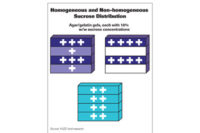Editorial: Uncompromising Taste

I had an interesting discussion with a supplier whose company has a significant presence in Europe. He contends that Europeans and Asians more readily lower their taste expectations when they know that a food containing nutraceuticals is good for them, and that this is acceptable to them. He thinks Americans eventually will do the same but, for now, there are a few obstacles.
First, Americans repeatedly have tried foods touted as being more healthful, particularly low-fat, low-calorie and, more recently, low-carb foods. However, they have been severely disappointed in regards to taste. These “fad” foods taught Americans that they didn't want to suffer while ingesting better-for-you foods and that the next time a “better” food comes around, they'll wait for someone else to try it first.
Second, Europeans and Asians, as well as people from other regions of the world, better understand the link between what you eat and the state of your health. While a foreigner may reach for a health bar, piece of fruit and yogurt for lunch, an American counterpart will order a salad at the local fast food restaurant, but have fries with it. Additionally, offered another supplier, Americans are more willing to look to pharmaceuticals for health solutions rather than to foods to solve their health issues.
Third, most of us may indeed consider buying a food that's better for us, if it's still within a reasonable price point. The grocery shelves are stocked with foods and beverages at very competitive prices. It's expensive to eat well. Consumers need to be convinced that paying more for a fortified pizza, for example, is really worth it.
The conclusion of the discussion was that American consumers are quickly learning about their health and proper nutrition, and their curiosity has resulted in the food industry taking an active role in their education. The interest is there; with the latest multi-functional ingredients and food technologies, the “perfect” taste profiles they seek should be available soon as well.
Looking for a reprint of this article?
From high-res PDFs to custom plaques, order your copy today!




